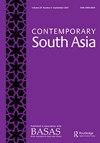Asserting caste? Bhishti sanitation workers and Muslim caste associations in Jaipur
IF 0.8
3区 社会学
Q3 AREA STUDIES
引用次数: 1
Abstract
ABSTRACT The article analyses the ways in which low-ranked Muslims mobilise collective terms for self-identification to avail preferential state policies (reservations). Specifically, it focuses on the strategies deployed by the Bhishtis, a caste group associated with carrying water, to be listed as Other Backward Classes (OBC) and claim municipal sanitation work as ‘safāī karamchārī’. Reservation policies are instrumental in shaping the Bhishtis' demands and social positions. They reproduce caste-based division of labour and accentuate internal cleavages within the community. While distancing themselves from elite emulation (Ashrafisation), the Bhishti simultaneously deploy caste-based and Islamic identities in their quest for material gains. Caste identity is used instrumentally vis-à-vis the state to avail OBC reservation and demand municipal sanitation jobs. Additionally, it functions as an oppositional identity towards upper class elites within the community. Islamic identity emphasises a work ethic and dignified labour, and enabled criticism of the state for practicing religious discrimination when a commitment to Bhishti employment was officially removed from the sanitation department. Internally, the Islamic identity helps keep the various factions within the community united. In fact, local articulations of birādarī identity evolve across space and time, questioning whether it is fruitful to talk about birādarī and caste.维护种姓吗?斋浦尔的比希提环卫工人和穆斯林种姓协会
本文分析了低等级穆斯林利用集体术语进行自我认同以利用国家优惠政策(保留)的方式。具体来说,它关注的是毗什提人所采取的策略,毗什提人是一个与供水有关的种姓群体,被列为其他落后阶级(OBC),并声称市政卫生工作是“safāī karamchārī”。预留政策在塑造毗什提人的要求和社会地位方面发挥了重要作用。它们再现了以种姓为基础的劳动分工,加剧了社会内部的分裂。在远离精英效仿(Ashrafisation)的同时,毗什提人同时利用基于种姓和伊斯兰教的身份来追求物质利益。种姓身份在-à-vis邦被用作工具,以利用种姓预留和要求市政环卫工作。此外,它还起到了对社区内上层阶级精英的对立身份的作用。伊斯兰身份强调职业道德和有尊严的劳动,当卫生部门正式取消对比什提人就业的承诺时,伊斯兰身份使人们能够批评政府实行宗教歧视。在内部,伊斯兰身份有助于保持社区内各派系的团结。事实上,当地对birādarī身份的表述跨越了时空,质疑讨论birādarī和种姓是否有意义。
本文章由计算机程序翻译,如有差异,请以英文原文为准。
求助全文
约1分钟内获得全文
求助全文
来源期刊

Contemporary South Asia
AREA STUDIES-
CiteScore
2.10
自引率
0.00%
发文量
82
期刊介绍:
The countries of South Asia - Bangladesh, Bhutan, India, Maldives, Nepal, Pakistan and Sri Lanka - are internally diverse and part of global flows of people, goods and ideas. Contemporary South Asia seeks to address the issues of the region by presenting research and analysis which is both cross-regional and multi-disciplinary. The journal encourages the development of new perspectives on the study of South Asia from across the arts and social sciences disciplines. We also welcome contributions to pan-regional and inter-disciplinary analysis. Our aim is to create a vibrant research space to explore the multidimensional issues of concern to scholars working on South Asia and South Asian diasporas in the postcolonial era.
 求助内容:
求助内容: 应助结果提醒方式:
应助结果提醒方式:


